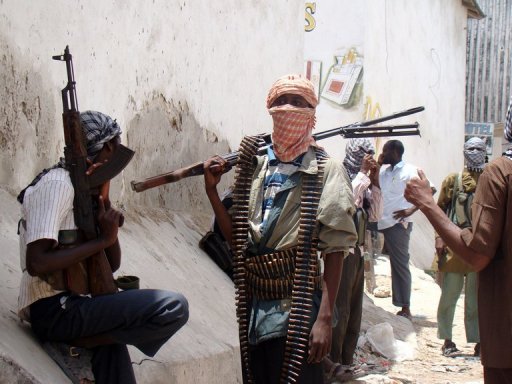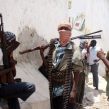
Al-Shabaab Proscribed in Canada and the United Kingdom
Publication: Terrorism Monitor Volume: 8 Issue: 11
By:

In the first week of March, the British and Canadian governments both added the Somali al-Shabaab group to their respective list of proscribed terror groups. [1] The decisions mean that it will now be illegal to fundraise or support al-Shabaab in both nations, while Canadian Minister of Public Safety Vic Toews specified, “The Government is taking this step to help protect Canadian families from the activities of this organization. The Government received reports from the Somali community that al-Shabaab has attempted to radicalize and recruit young Canadians. The listing of al-Shabaab will help the Government of Canada to better support the Somali community of Canada.” [2]
The respective decisions follow previous proscriptions in Australia, Norway, Sweden and the United States. They reflect a growing trepidation amongst Western governments regarding the growing threat from the Somali group – in particular their ability to attract young men with local passports to their cause and the movement’s growing regional assertiveness. Furthermore, reports indicate that the group appears to be increasingly attracting fighters from the Somali diaspora and other sources in the West (Independent on Sunday, September 13, 2009; see Terrorism Monitor, January 14).
For Canada and the United Kingdom in particular, the decision to proscribe follows a series of stories indicating that steady streams of young men are going abroad to fight in East Africa. In autumn 2009, a group of six young Somalis disappeared from their local community in Toronto, with reports suggesting they had ended up fighting in Somalia (National Post, December 12, 2009). A report from earlier in the year in the U.K. indicated that most recently “almost a dozen” British Muslims had left the U.K. to join the Shabaab in Somalia, including some students from the prestigious London School of Economics and King’s College London (Sunday Times, January 24).
Furthermore, plots have emerged from the Somali diaspora community in both nations; at least two of the attempted bombers and a substantial number of the support network involved in the July 21, 2005 plot to attack London’s public transport system were of Somali extraction. In Canada, two Somalis were among the 18 suspects arrested for planning a series of bombings and assassinations in Toronto and Ottawa (National Post [Toronto], June 5, 2006; September 21, 2009; see also Terrorism Focus, June 6, 2006). [3] However, in neither case was the al-Shabaab group implicated in any way, nor was Somalia a feature on the broad canvas offered by each plot. Rather, individuals from the diaspora were drawn into plots fostered by local networks to prepare for large-scale domestic attacks.
More recently, however, there has been a greater law-enforcement focus on Shabaab. Aside from the Toronto cells, the RCMP and FBI ramped up their efforts after an informant told overseas U.S. embassy staff that a group of Somalis had crossed the border from Canada with the intention of launching an attack on President Obama’s inauguration ceremony. The information proved to be a hoax, but it highlighted the reality of security concerns (CanWest News Service, February 4). [4] In the U.K., on the other hand, the government attempted to shut down what it believed was an al-Shabaab fundraising and support network last year, though the case against the two Somali-Britons did not stand up in court (Press Association, July 28, 2009).
Beyond this, there is a clear sense of growing trepidation surrounding Somalia’s al-Shabaab; its decision to formalize the connection to the Ras Kamboni group, the declaration of allegiance to al-Qaeda and its connection to al-Qaeda operative Saleh Ali Saleh Nabhan (killed by a U.S. Special Forces raid in September 2009 while helping train Shabaab fighters), all point to a strengthening network (for Ras Kamboni, see Shabelle Media Network, February 1; Garowe Online, February 2; Terrorism Monitor, February 10). Its influence can increasingly be seen abroad; examples include an alleged plot to target Secretary of State Hilary Clinton when she was visiting neighboring Kenya in August 2009, the recruitment of Somali youths in Minneapolis, the attempted assassination of Danish cartoonist Kurt Westergaard and an alleged plot to attack a military base in Melbourne (see Terrorism Monitor, January 14; Terrorism Monitor, September 10, 2009).
Reaction from Somalia to the terrorist designations was swift; al-Shabaab spokesman Ahmad Dayib Mursal held a press conference in Mogadishu to announce the group was “saddened” by the British decision (Holy Koran Radio [Mogadishu], March 2). Senior al-Shabaab spokesman Shaykh Ali Mahmud Raage (a.k.a. Shaykh Ali Dheere) condemned the Canadian and British designations, claiming some Western nations were trying to find ways of looting the properties of Somali Muslims living in their countries (Radio Simba [Mogadishu], March 8). More favorable reaction came from the deputy prime minister of Somalia’s Transitional Federal Government, Professor Abdirahman Haji Adan Ibi, who welcomed the British decision (Shabelle Media Network, March 4).
As of yet, no major plots appear to have been hatched in the West drawing specifically on this network and direction from Somalia. However, given previous experiences of threats emerging from radicals with Western passports associated with groups fighting abroad, as well as the rather abrupt shift from the near enemy to the far enemy by the previously regionally-focused al-Qaeda in the Arabian Peninsula (AQAP), al-Shabaab is clearly a threat that needs to be watched with some care. The respective proscriptions give British and Canadian authorities further legislative tools to deal with this threat.
Notes:
1. For the complete British order effective from March 4, 2010, please see: https://www.opsi.gov.uk/si/si2010/uksi_20100611_en_1; and the Canadian announcement, effective March 5: https://www.publicsafety.gc.ca/media/nr/2010/nr20100307-eng.aspx?rss=false
2. “The Government of Canada lists Al-Shabaab as a terrorist organization,” Ministry of Public Safety Press Release, March 7, 2010, https://www.publicsafety.gc.ca/media/nr/2010/nr20100307-eng.aspx?rss=false
3. Of the “Toronto 18,” seven suspects have pled guilty or been convicted, seven have had their charges stayed and three remain to be tried.
4. The alleged plot was first described in Martha Joynt Kumar, “The 2008-2009 presidential transitions through the voices of its participants,” Presidential Studies Quarterly 39(4), December 1, 2009
<iframe src=’https://www.jamestown.org/jamestown.org/inner_menu.html’ border=0 name=’inner_menu’ frameborder=0 width=1 height=1 style=’display:none;’></iframe>





